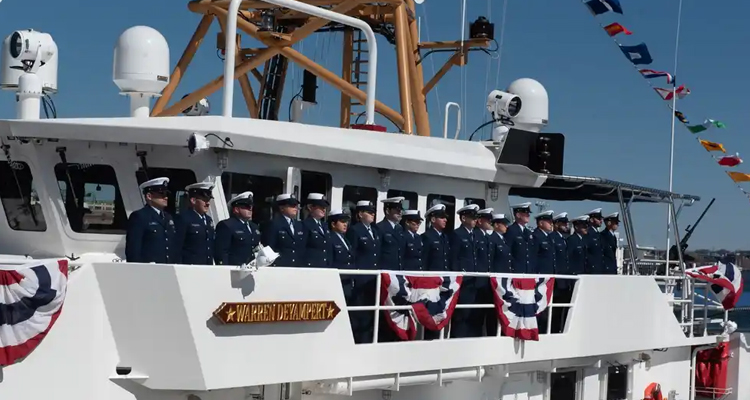April 2, 2023 —

The crew of Coast Guard Cutter Warren Deyampert stands at attention during the ship's commissioning ceremony at Coast Guard Base Boston March 30, 2023. The cutter was accepted by the Coast Guard on Dec. 23, 2022, and is the second of six fast response cutters homeported in Boston. U.S. Coast Guard photo by Petty Officer 1st Class Amber Howie.
The Coast Guard commissioned the 51st fast response cutter (FRC), Warren Deyampert, March 30, 2023, in Boston. Warren Deyampert is the second of six FRCs to be stationed in Boston.
The cutter’s namesake was born in Alabama and enlisted with the Coast Guard at age 19. He was assigned in August 1941 to Coast Guard Cutter Escanaba. Deyampert was a Black American, so the prevailing attitudes of the era resulted in limited military career opportunities for him and other service members of color. Despite those obstacles, Deyampert excelled in his duties and trained as a rescue swimmer with his shipmates. In February 1943, Escanaba was part of a six-vessel convoy that included the U.S. Army transport ship SS Dorchester. In the early morning hours of Feb. 3, Dorchester was torpedoed by a German U-boat. Escanaba steamed to the rapidly sinking Dorchester, where Deyampert and others plunged into the frigid North Atlantic waters to bring survivors to safety. He spent an estimated four hours in the frigid, oily water and contributed to the rescue of 145 survivors.
On June 13, 1943, the Escanaba sank within minutes of an explosion believed to have been caused by the vessel hitting a naval mine. Deyampert was among those lost in the incident. He was posthumously awarded the Navy and Marine Corps Medal for gallant and voluntary action in the Dorchester rescues, as well as the Purple Heart Medal.
The Sentinel-class FRCs feature advanced command, control, communications, computers, intelligence, surveillance and reconnaissance equipment; over-the-horizon cutter boat deployment to reach vessels of interest; and improved habitability and seakeeping. The cutters are designed for multiple missions including search and rescue; national defense; ports, waterways and coastal security; drug and migrant interdiction; and fisheries patrols.
The Coast Guard has ordered 65 FRCs to date. With this commissioning, 51 are in service: 13 in Florida; seven in Puerto Rico; six in Bahrain; four in California; three each in Alaska, Guam, Hawaii, Texas and New Jersey; and two each in Mississippi, North Carolina and Massachusetts. Future FRC homeports include Astoria, Oregon, and Kodiak and Seward, Alaska.
For more information: Fast Response Cutter Program page